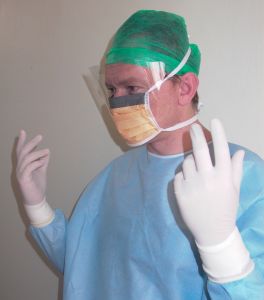According to a recent article from the West Virginia Record, a federal jury has just awarded a plaintiff $3.27 million in a multidistrict litigation (MDL) case involving transvaginal mesh (TVM) products manufactured by Johnson & Johnson.
 This case involved the Gynecare TVT Obturator. This device, manufactured by Ethicon, a Johnson & Johnson subsidiary, is a surgically implanted medical device used in the treatment of stress urinary incontinence. The TVM device consists of what is essentially a layer of mesh being held within a support device. The fact that it is supported in this manner is the reason it is called a tension-free vaginal tape (TVT) design, which was marketed as being superior and safer than previous TVM devices that are linked to serious injuries to patients, including erosion of tissue and vaginal dehiscence.
This case involved the Gynecare TVT Obturator. This device, manufactured by Ethicon, a Johnson & Johnson subsidiary, is a surgically implanted medical device used in the treatment of stress urinary incontinence. The TVM device consists of what is essentially a layer of mesh being held within a support device. The fact that it is supported in this manner is the reason it is called a tension-free vaginal tape (TVT) design, which was marketed as being superior and safer than previous TVM devices that are linked to serious injuries to patients, including erosion of tissue and vaginal dehiscence.
As our TVM plaintiff attorneys in New England understand, these products pose several other risks to women, including erosion of the mesh itself. There is also a risk that, when the device is surgically implanted through incisions made in the vagina and then anchored to the pelvic bone, the patient’s bowel and other internal organs may be perforated (punctured), resulting in internal bleeding, urinary incontinence, and potentially deadly infections.
In this case, the jury found that the drug company had defectively designed the product and failed to adequately warn doctors and patients of known risks. The verdict was in the amount of $100,000 to compensate for medical expenses, $470,000 in pain and suffering and emotional distress that had already been experienced, and $2.5 million for pain and suffering, disability, and loss of enjoyment of life that will likely be experienced by plaintiff in the future. Plaintiff’s husband was also awarded $200,000 in damages associated with loss of consortium.
Continue reading
 This transvaginal mesh lawsuit was being heard before the United States District Court for the Central District of California. Trial has already begun in this case, and there had been about a week of testimony and evidence presented prior to the parties agreeing to settle the matter, rather than letting a jury ultimately decide on the case.
This transvaginal mesh lawsuit was being heard before the United States District Court for the Central District of California. Trial has already begun in this case, and there had been about a week of testimony and evidence presented prior to the parties agreeing to settle the matter, rather than letting a jury ultimately decide on the case. Product Liability Lawyer Blog
Product Liability Lawyer Blog









